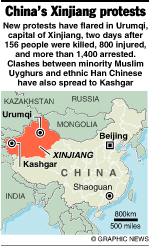Sunday Times 2
China says 13 attackers killed in Xinjiang assault
View(s):BEIJING, June 21, (AFP) – Chinese police shot dead 13 people in the restive Xinjiang region after they drove into a police building and set off an explosion today, regional authorities said.
The vast and resource-rich region in China’s far west is home to the mainly Muslim Uighur ethnic minority and has faced a series of violent attacks in recent years.
“Today thugs crashed a car into the public security building of Kargilik county in Xinjiang’s Kashgar prefecture and set off an explosion. Police took decisive action and shot dead 13 thugs,” the official Tianshan regional government website reported.
Three police suffered injuries but there were no other casualties, the report said, without providing further details. It was unclear if the attackers used one or more explosive devices.
The government has vowed a year-long crackdown on terrorism in recent weeks following several high-profile attacks.
Authorities have announced hundreds of detentions or criminal punishments, including the sentencing of 55 people in late May for offences such as terrorism at a ceremony in a stadium attended by 7,000 people.
This week China executed 13 people for “terrorist attacks” in Xinjiang and ordered the death penalty for three others for a car crash last October in Beijing’s Tiananmen Square, the symbolic heart of the Chinese state.
In that incident, the first major event blamed on Xinjiang residents to take place outside the region, three family members drove onto the popular tourist area, killing two people and wounding 40 before the car burst into flames and they themselves died.
In another major incident in March, dubbed China’s “9/11” by state media, attackers went on a stabbing spree at a railway station in the southwestern city of Kunming that left 29 people dead and 143 wounded.
Two months later attackers in the Xinjiang capital of Urumqi threw explosives and ploughed into a crowd at a market, leaving 39 people killed, along with four attackers, and more than 90 wounded.
Although violence has occurred periodically across Xinjiang for years, few attacks had targeted ordinary citizens rather than police or government institutions.
Overseas rights groups blame the unrest in part on cultural repression and harsh security measures against Uighurs while Xinjiang’s economic growth mostly benefits an influx of China’s ethnic majority Han.
Riots erupted between the two ethnic groups in Urumqi in 2009, leaving about 200 people dead.
Beijing counters that it has brought rapid development to the area and blames the violence on separatist militant groups backed by overseas militant organisations including the Turkestan Islamic Party (TIP) and East Turkestan Islamic Movement (ETIM).
Security experts have cast doubt on the strength of any resistance movement inside Xinjiang or its links to foreign groups.

